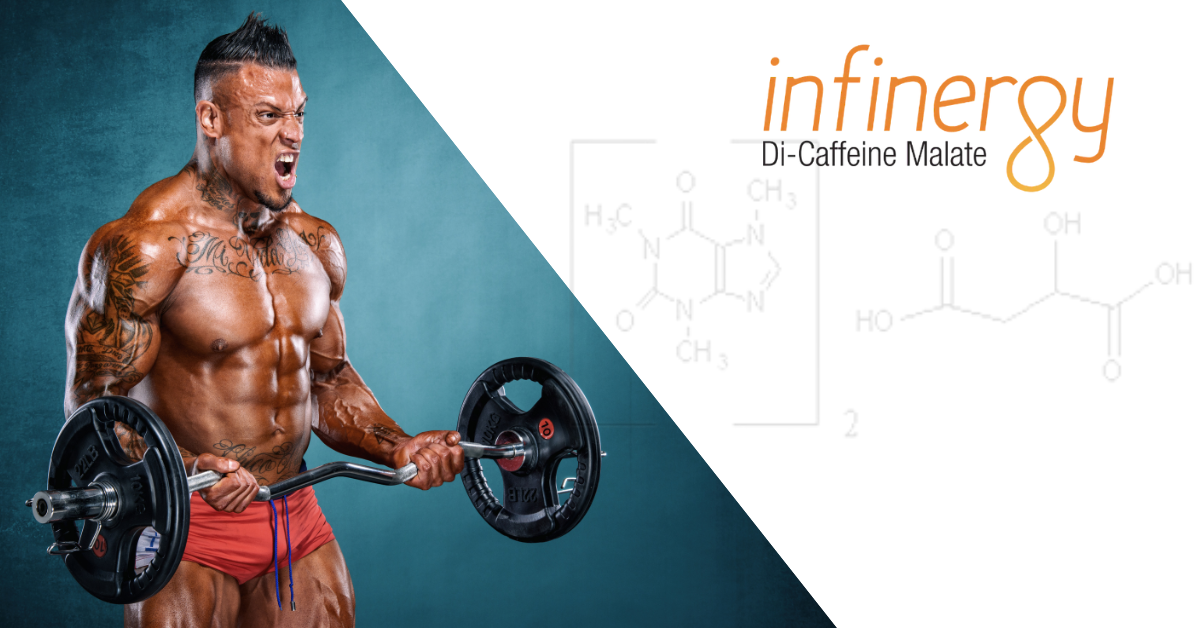
Caffeine malate, also known as dicaffeine malate, is a unique compound that combines caffeine and malic acid.
This combination is designed to provide a slower release of caffeine than other forms, leading to sustained energy and focus without the crash that can sometimes occur with other forms of caffeine.
Known by aliases such as di-caffeine malate or Infinergy, caffeine malate is a distinctive fusion of caffeine and malic acid.
Its claim to fame lies in its capacity to deliver a smooth, enduring energy boost, sidestepping the jitters or crashes typically associated with other caffeine forms.

Caffeine malate is a unique blend of caffeine and malic acid.
It's like a power duo that brings together the best of both worlds.
Caffeine is a natural pick-me-up that we often get from drinks like coffee and tea.
It's like a wake-up call for your brain, helping you feel more alert and focused.
On the other hand, malic acid is a substance that our bodies make when we turn carbs into energy.
It's also found in fruits and veggies.
It's like a behind-the-scenes worker, playing a key role in how our bodies use and store energy.
When caffeine and malic acid are combined to form caffeine malate, they create an energy boost different from what you get with caffeine alone.
Thanks to malic acid, the energy kick from caffeine malate is more gradual and lasts longer.
This makes it a favorite among athletes and those who need to stay energized and focused for more extended periods.
This unique blend of caffeine and malic acid also tends to be easier on the stomach, which is a bonus for those who might find that caffeine alone upsets their stomach.
So, in a nutshell, caffeine malate is like a gentler, longer-lasting version of caffeine that's designed to give you the energy boost you need without a sudden crash or stomach upset.
Caffeine is a well-known stimulant that blocks the effects of adenosine, a chemical that builds up in the brain over the day and makes us tired.
Caffeine-blocking adenosine can help improve energy, focus, and alertness.
Malic acid is a naturally occurring organic acid that produces energy in the body.
When combined with caffeine, malic acid may enhance the effects of caffeine and help improve endurance.
One of the key benefits of caffeine malate over regular caffeine is its sustained release.
This is primarily due to the combination of caffeine and malic acid.
The malic acid helps to buffer the caffeine, allowing it to be released slowly over time.
This slow release of caffeine provides a steady energy supply, helping to avoid the sudden energy crashes often associated with other forms of caffeine.
The mechanism behind this sustained release involves the malic acid component of caffeine malate. Malic acid is a dicarboxylic acid, which means it has two carboxyl groups.
These carboxyl groups can form bonds with the caffeine molecule, creating a stable compound that breaks down slowly in the body.
As the caffeine malate compound is metabolized, the caffeine is gradually released.
This slow release provides a steady supply of caffeine into the bloodstream, resulting in a prolonged energy boost.
The sustained release of caffeine from caffeine malate has several benefits.
It provides a steady and prolonged energy boost, which can help improve focus and productivity.
This is particularly beneficial for athletes and individuals who need sustained energy for long periods.
The slow release of caffeine also helps to avoid the sudden energy crashes often associated with other forms of caffeine.
This makes caffeine malate a popular choice for those who want the benefits of caffeine without the unwanted side effects.
Caffeine malate may help improve energy and focus, making it a popular supplement for athletes and fitness enthusiasts.
By blocking adenosine and enhancing the effects of caffeine, caffeine malate may help improve mental alertness and physical performance.
The combination of caffeine and malic acid may also help improve endurance by enhancing energy production in the body.
This can help athletes and fitness enthusiasts power through tough workouts and improve overall performance.
Caffeine has been shown to have a mild thermogenic effect, which can help boost metabolism and increase calorie burning.
Caffeine malate may be a useful supplement for those seeking to support weight loss efforts.

Malic acid can offer several benefits, particularly in physical workouts when combined with caffeine to form caffeine malate.
Firstly, malic acid plays a crucial role in the Krebs cycle.
Aerobic organisms use This series of chemical reactions to release stored energy.
This process is essential for energy production within the body's cells, especially during physical exercise.
By contributing to the Krebs cycle, malic acid can help increase energy production, potentially enhancing workout performance.
Secondly, malic acid has been found to help buffer lactic acid in the muscles during intense workouts.
Lactic acid build-up often leads to muscle fatigue and soreness, hindering performance and recovery.
By helping to buffer lactic acid, malic acid can potentially reduce muscle fatigue and enhance recovery, allowing for more efficient workouts.
Also, malic acid may enhance oxygen utilization, particularly during exercise.
This can lead to improved endurance and performance during workouts.
Lastly, when combined with caffeine, malic acid can help enhance the absorption and utilization of caffeine.
This can lead to a smoother release of energy, avoiding the sudden spikes and crashes often associated with caffeine consumption.
This can be particularly beneficial during workouts, providing steady energy and potentially enhancing performance.
Infinergy is a patented form of caffeine malate known for its unique benefits.
Developed by Creative Compounds, it's designed to provide all the benefits of caffeine without the common downsides.
Infinergy contains approximately 75% caffeine and 25% malic acid.
This combination allows for a slower release of caffeine, providing a more sustained energy boost.
It's like a slow-release energy pill, helping to prevent the sudden crashes associated with other forms of caffeine.
Moreover, Infinergy is also more easily digestible, thanks to the presence of malic acid.
This makes it a popular choice among athletes and fitness enthusiasts, who often need to consume caffeine before or during workouts.
In conclusion, whether it's malic acid or various forms of caffeine, understanding these ingredients and their benefits can help you make informed decisions about your health and wellness.
Remember, your needs and circumstances may depend on what works best for you.
While caffeine malate is generally considered safe when taken at recommended dosages, there are some potential risks.
These include:
Like other forms of caffeine, caffeine malate may cause side effects such as jitters, anxiety, and insomnia in some people.
It's important to start with a low dosage and gradually increase as tolerated to avoid these side effects.
Caffeine can interact with certain medications, including blood thinners, antibiotics, and antidepressants.
It's important to talk to your healthcare provider before taking caffeine malate if you are taking any medications.
Some people may be allergic to caffeine or malic acid, which could lead to adverse reactions.
Caffeine malate, also known as dicaffeine malate or Infinergy, is a unique compound that combines caffeine and malic acid.
This combination is designed to provide a sustained release of energy, different from the immediate rush and subsequent crash often associated with regular caffeine.
The process begins when caffeine malate enters the body.
The caffeine component stimulates the central nervous system, increasing alertness and reducing the perception of fatigue.
This is the initial energy boost most of us are familiar with when we consume caffeine.
The malic acid component plays a crucial role in the sustained release of energy.
Malic acid is involved in the Krebs cycle, a series of chemical reactions in the body that generates energy.
By contributing to this cycle, malic acid helps to provide a steady supply of energy over a longer period.
Another important aspect of caffeine malate's sustained energy release is its buffering effect.
Combining caffeine and malic acid creates a less acidic compound than caffeine alone.
This means it's easier on the stomach and can be absorbed more slowly, further contributing to the sustained release of energy.

The result of this sustained energy release is that you don't experience the typical 'crash' associated with regular caffeine.
Instead of a sudden drop in energy levels once the caffeine has worn off, the energy decline is more gradual, allowing for better performance and focus over a longer period.
The science supporting the sustained release of energy by caffeine malate is still emerging.
However, preliminary research and anecdotal evidence suggest it can provide a longer-lasting energy boost than regular caffeine.
This makes it an increasingly popular choice in pre-workout supplements and energy drinks.
When it comes to caffeine, not all forms are created equal. For instance, caffeine anhydrous and caffeine malate have different properties and effects on the body.
Caffeine anhydrous is essentially the dehydrated form of caffeine.
It's a highly concentrated caffeine version commonly found in pills and supplements.
It's like caffeine in its purest form, providing a quick and powerful energy boost.
However, this also means that it can lead to a sudden crash once the effects wear off.
On the other hand, caffeine malate is a compound made from caffeine and malic acid.
This combination allows for a slower release of caffeine, providing a more sustained and gradual energy boost.
It's like a steady stream of energy, helping to prevent the sudden crashes associated with caffeine anhydrous.
Moreover, malic acid may help reduce the digestive issues often associated with caffeine consumption. Read more about caffeine vs. caffeine malate.
When it comes to caffeine malate, or Di-Caffeine Malate, understanding the right dosage is crucial.
This unique form of caffeine, combined with malic acid, is known for its slower release of caffeine.
This means it can provide sustained energy and focus without the crash that can sometimes occur with other forms of caffeine.
But how much should you take?
Well, it's not as straightforward as you might think.
The dosage of Di-Caffeine Malate can depend on several factors.
For instance, it's often paired with caffeine anhydrous in supplements, so you must be aware of the total amount of caffeine you consume.
Here's a key point: Di-Caffeine Malate is 75% caffeine and 25% malic acid.
So, if you see 100mg of Di-Caffeine Malate supplement, you get 75mg of caffeine.
As with any supplement, it's important to start with a low dosage and gradually increase as tolerated.
This can help avoid side effects such as jitters, anxiety, and insomnia. And remember, everyone's tolerance to caffeine is different, so what works for one person may not work for another.
Finally, if you find that you're not getting the same energy boost from your Di-Caffeine Malate supplement as you once were, it might be time for a caffeine break.
Many people find that a 1-2 weeks break can help reset their caffeine tolerance.
Caffeine citrate is another form of caffeine, often used in medical settings for its rapid onset of action.
It's particularly effective in treating conditions like neonatal apnea, where it acts quickly to stimulate breathing.
However, caffeine malate may suit the average person seeking a caffeine boost.
As mentioned earlier, caffeine malate provides a more sustained and gradual energy boost, making it ideal for those needing prolonged focus and alertness.
It's like a long-lasting battery, providing steady energy without sudden crashes.
You can find pre-workouts categorized by their caffeine content here.
What is caffeine malate?
Caffeine malate is a compound made up of caffeine and malic acid. It's often used in pre-workout supplements due to its potential to enhance both physical and mental performance.
How does caffeine malate compare to other forms of caffeine?
Caffeine malate is believed to provide a more sustained and gradual energy boost than other forms of caffeine. This is due to the malic acid component, which is involved in energy production in the body.
What are the benefits of malic acid in caffeine malate?
Malic acid is involved in the production of ATP, the body's main source of energy. It's also believed to help with muscle performance and recovery, making it a beneficial component of caffeine malate.
What is Infinergy?
Infinergy is a patented form of caffeine malate known for its unique benefits. It's designed to provide all the benefits of caffeine without the common downsides, such as sudden energy crashes.
Can caffeine malate help with exercise performance?
Some research suggests that caffeine malate can enhance exercise performance by providing a sustained energy boost and helping with muscle performance and recovery. However, individual responses can vary.
What is the recommended dosage of caffeine malate?
The recommended dosage of caffeine malate can vary depending on individual factors such as body weight and tolerance to caffeine. It's always best to consult a healthcare professional before starting any new supplement regimen.
Are there any side effects of caffeine malate?
As with any supplement containing caffeine, potential side effects of caffeine malate can include jitteriness, increased heart rate, and trouble sleeping. If you experience any adverse effects, it's recommended to discontinue use and consult with a healthcare professional.
Can I take caffeine malate if I'm sensitive to caffeine?
If you're sensitive to caffeine, starting with a lower caffeine malate or considering other non-caffeinated alternatives is best. Always consult with a healthcare professional if you're unsure.
Can I take caffeine malate with other supplements?
Caffeine malate can be taken with other supplements, but it's important to consider the total amount of caffeine you consume from all sources. Too much caffeine can lead to side effects such as jitteriness and trouble sleeping.
Where can I find caffeine malate?
Caffeine malate is commonly found in pre-workout supplements, which can be purchased online or at health and fitness stores.
Caffeine malate, a combination of caffeine and malic acid, is a popular ingredient in pre-workout supplements due to its potential to enhance physical and mental performance.
The malic acid component is believed to help with energy production, muscle performance, and recovery, while caffeine is well-known for its stimulating effects.
However, it's important to note that individual responses to caffeine malate can vary, and it's always a good idea to consult with a healthcare professional before starting any new supplement regimen.
Useful Links
 About FitFrek
About FitFrekFitFrek operates as an independent platform, offering comprehensive workouts, programs, routines, guides, and unbiased reviews to accelerate your progress. We pride ourselves on our honesty, delivering straightforward and candid insights. FitFrek does not offer medical advice, diagnosis, or treatment services.